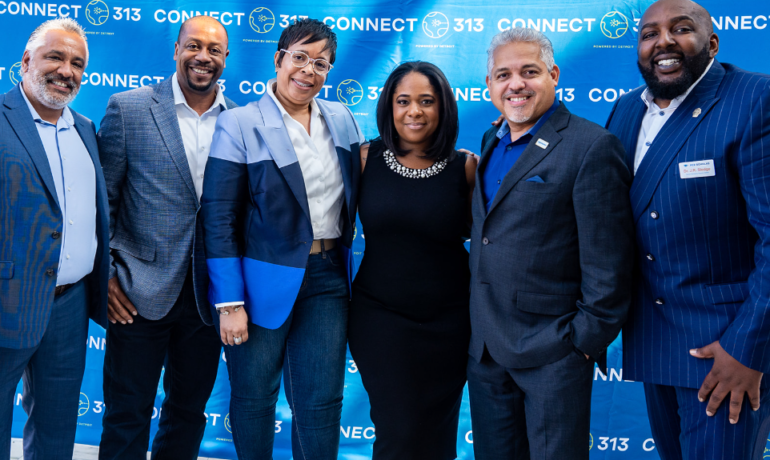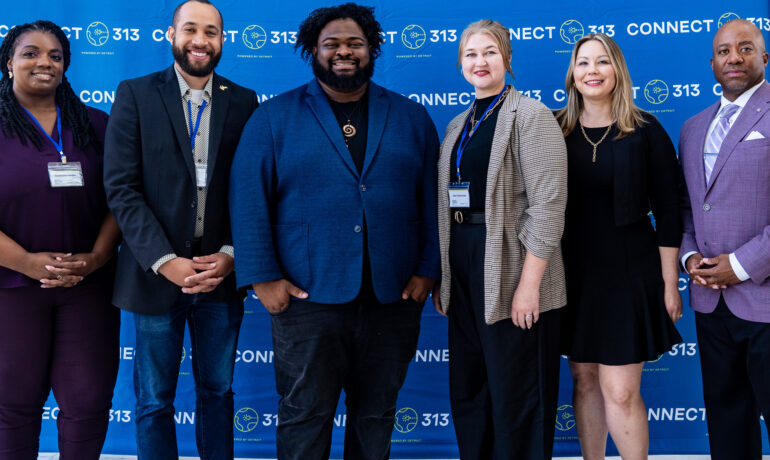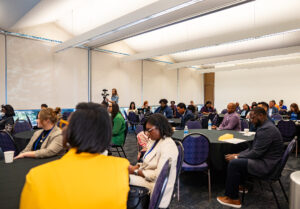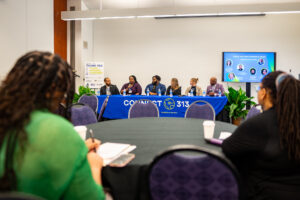DDIW 2023 Panel Looks at Advancing Digital Literacy in Detroit to Promote Workforce Development
DDIW 2023 Panel Looks at Advancing Digital Literacy in Detroit to Promote Workforce Development
Recognizing that a tech gap exists in Detroit’s talent pool, a panel of experts got to work October 2 at Wayne State University exploring how to advance digital literacy across the city to promote workforce development. Their conversation was part of a series of informative and interactive panel discussions marking the start of this year’s Detroit Digital Inclusion Week powered by Connect 313.
“We are building pathways to accessibility for digital tools and technology so everyone can become digitally literate,” said Myka Burley, associate director of skills at Michigan Central and panel moderator. “When we take those tools and employ them in ways that empower people economically, we get into real workforce development initiatives.”
Burley was joined by Christine Burkette, director of Digital Equity & Inclusion, the City of Detroit, Department of Innovation and Technology; Jai Oberoi, senior VP of data intelligence for Rocket Mortgage; Germaine Reece, business diversity manager at Central CDW; and Jose Reyes, executive director for NPower.
Their conversation was wide ranging and punctuated by personal anecdotes and insights from careers dedicated to technology and to advancing opportunities for populations often underserved or left behind. Jose Reyes recalled being in the computer lab at the University of Michigan decades ago and losing a paper because he didn’t know how to properly operate the Apple computer he was working on.
“Many families experience that lack of tech literacy every day because connectivity and technology are not in their reach. Ours was one of them,” Reyes shared. “We have to be passionate about this effort and see this issue as generational because if the parents don’t have digital equity, then their kids won’t either.”
Panelists agreed and said that every opportunity must be leveraged to meet people where they are … a notion often cited throughout the day’s four panel discussions.
“We can’t assume people know,” Burkette said. “So, when you’re distributing devices start literacy then and put information where they’re at, not necessarily on paper, and make it multilingual.”
Each panelist noted the critical role of bringing together employers and community organizations to increase digital literacy, mitigate the tech gap and help potential employees overcome what many see as systemic barriers.
“Sometimes life happens and impacts a person no matter how accountable she or he is,” Dr. Sledge explained. “At Per Scholas, we’re not just looking for the brightest and the best because when I can take somebody who was hesitant about IT and had life issues, and I can support them and facilitate their growth and certification … I’ve done my job.”
Finally, Burley asked the panelist what they hoped the tech employment landscape in Detroit would be in five years, and to consider the impact of AI and the rapid pace of tech advancement.
Burkette called out a variety of demographic groups – veterans, returning citizens, non-English speaking residents – with differing needs and forming teams to address those needs, while Jai Oberoi mentioned the concept of “leap frogging.”
“With the acceleration of technology and AI, employment must leapfrog,” Oberoi shared. “The concept of starting with an entry level job gets replaced with talent hopping four or five levels in one move because the technology is already in their hands and what workers thought was out of reach is now actually within their grasp.”
Lastly, and for a second time that October day, the idea surfaced that Detroit could again serve as a global hub for technology and advancement bolstered by a talented workforce hungry for opportunity and uniquely equipped to move with the speed of innovation.
Special Thanks to DDIW Sponsors and Partners
Detroit Digital Inclusion Week was generously sponsored by DELL, Comcast, Verizon and Wayne State University, and supported by Connect 313 partners the City of Detroit, Rocket Community Fund and United Way for Southeastern Michigan.
Boost your digital literacy by taking advantage of Connect 313’s network of 22 Neighborhood Tech Hubs, meeting with a Community Ambassador to learn more about available resources, submitting a suggestion for a community initiative, signing up for the Affordable Connectivity Program by calling 313-241-7618, receiving free digital skills training and tech support and more, and becoming a member at connect313.org.



 “Closing the digital divide in Michigan appears different depending on where you are in the state,” said Allie Herkenroder, Michigan’s digital equity director. “We can’t just put a one-size-fits-all solution everywhere and have it work.”
“Closing the digital divide in Michigan appears different depending on where you are in the state,” said Allie Herkenroder, Michigan’s digital equity director. “We can’t just put a one-size-fits-all solution everywhere and have it work.” Finally, the five panelists agreed that as with any complex issuethe best place to find a solution starts by establishing common ground.
Finally, the five panelists agreed that as with any complex issuethe best place to find a solution starts by establishing common ground.